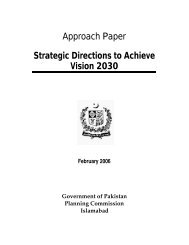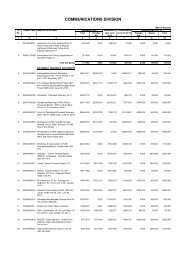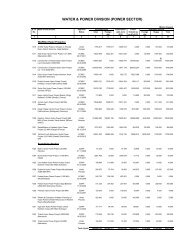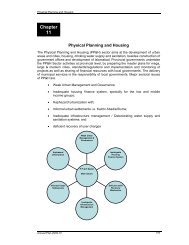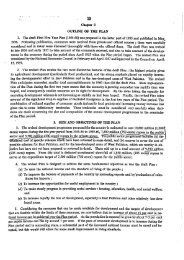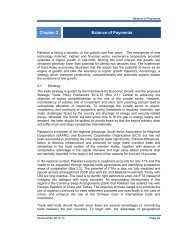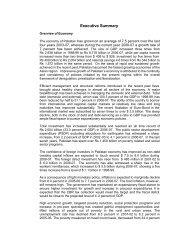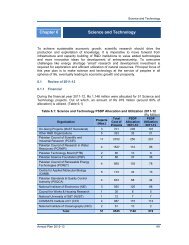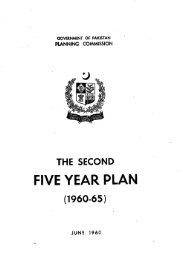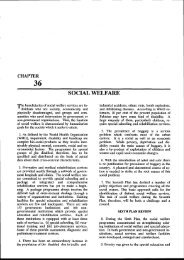Manual for Development Projects - Planning Commission
Manual for Development Projects - Planning Commission
Manual for Development Projects - Planning Commission
You also want an ePaper? Increase the reach of your titles
YUMPU automatically turns print PDFs into web optimized ePapers that Google loves.
Chapter-7<br />
PROJECTS BY THE COMMITTEE HEADED BY DEPUTY CHAIRMAN, PLANNING<br />
COMMISSION.<br />
7.22 The ECNEC in its meeting held on 18-9-1993 decided that <strong>for</strong>eign aided projects severely affected<br />
by impediments be identified by Economic Affairs Division and conveyed to <strong>Planning</strong> and <strong>Development</strong><br />
Division <strong>for</strong> review by a Committee headed by Deputy Chairman, <strong>Planning</strong> <strong>Commission</strong> and consisting<br />
of Secretaries of Finance, Economic Affairs, <strong>Planning</strong> & <strong>Development</strong>, the concerned<br />
Ministries/Divisions and Additional Chief Secretaries (<strong>Development</strong>) of the concerned Provinces to<br />
restructure or close the projects. The <strong>Projects</strong> Wing, <strong>Planning</strong> and <strong>Development</strong> Division is secretariat of<br />
the Committee.<br />
7.23 The Cabinet in its meeting held on 17th October, 1994 decided that Secretaries/Additional<br />
Secretaries Incharge of concerned Ministries/Divisions should personally participate. Participation in<br />
this meeting should be given priority over any other meeting/engagement and <strong>for</strong>eign/local tours. The<br />
Economic Coordination Committee of the Cabinet in its meeting held on 4th December, 1995 decided<br />
that the Committee should meet once in two months.<br />
PROJECT MONITORING<br />
Role in the Project Cycle<br />
7.24 The first three stages of the project cycle (identification, preparation and appraisal/approval),<br />
precede the actual project implementation stage. Once the implementation stage is reached, the<br />
"monitoring activity" assumes great importance which is followed by the final stage, i.e. project<br />
completion/post-completion evaluation. The importance of "monitoring and evaluation" activities hardly<br />
needs any emphasis since both provide timely and useful in<strong>for</strong>mation not only to the project<br />
management/implementation agencies but also a feed-back to the policy makers. The linkage between the<br />
stages is also important. Each stage leads to the next and the last phase, in turn, produces new<br />
approaches/ideas, improving the planning and implementation process of future projects. This makes the<br />
"Project Cycle" self-renewing.<br />
Conceptual Definition<br />
Page 15 of 26<br />
7.25 Conceptually, "monitoring" means to check and assess the implementation status of a<br />
project/programme/plan during the implementation on a regular basis. The system of watching/<br />
monitoring the progress of a programme/ project implementation, besides being an important link in the<br />
project cycle, helps in the identification/analysis and removal of bottlenecks and expediting action where<br />
http://hd2/pc/popup/ch7_p.html<br />
9/23/2010



